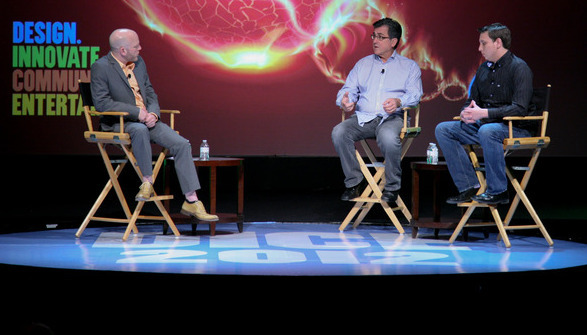
If you ask people what a game developer does, most of them would give a simple answer—they make games. But if you ask someone what a game publisher does, most casual observers would have a much harder time giving you an answer. And these days, a lot of people in the game industry might have some questions about that, too.
The DICE Summit on Wednesday hosted an interesting discussion of whether the traditional publisher role—which primarily involves supporting developers and marketing their titles—really has a place in a gaming world that's rapidly discarding old ideas and business models.
Publishing then versus publishing now
"Publishers were great in the '80s and '90s when people didn't understand what games were," said Wedbush Morgan analyst Michael Pachter. "When you needed them to market to the audience, to get the games on the shelf, to give developers motivation to work."
But things have changed since what Pachter said was gaming's "golden age." These days, Pachter said, the big publishers have become risk-averse mega-corporations driven by "the financial guys" who are looking for the lowest common denominator answer to how to make the most money.
"Back [in the '80s and '90s], if you sold 300,000 to 400,000 units you made money... [now] if a game isn't going to sell 300,000 units, [they say] forget it, don't even try."
The result is mega-publishers like Activision Blizzard, which makes 90 percent of their revenues from two franchises, Pachter pointed out. Meanwhile, a company like THQ recently had to cut its development staff significantly despite bringing in $800 million in revenue.
The big publishers have mimicked the worst of Hollywood's focus on retreads and sequels, Pachter argued, but they have it even worse, because "Sylvester Stallone is too old to make Rocky movies anymore, and Mel Gibson is too crazy to make Lethal Weapon movies anymore. They have to come up with new ideas eventually ... [but] I think we're going to play Call of Duty 37 in 10 years, and they'll be up to two a year at that point."
Publishers as innovation finders
On the other side of the argument, EEDAR analyst Jesse Divnich argued that big publishers are still important for identifying good games and getting them in front of people. His primary example for this was the Guitar Hero franchise, which had a sizeable niche audience for its first two games before Activision bought it out and made it a worldwide phenomenon (while driving the concept into the ground, I might add).
"[The industry experts], we'd play it anyway, but we're only 10 to 15 percent of the market," Divnich said. "The rest of industry only buys what the TV tells them to buy. Guys like Activision act as a conduit, finding innovative games and getting them in front of people."
Divnich even extended the argument to indie games, saying that breakout titles like Limbo, Braid and Bastion would not have been nearly so successful without the backing of a publisher. Minecraft, he said, was the most significant exception of a breakout hit where the developer didn't need any outside help to get huge. For most indie games, "the ones you do hear of are usually the ones backed by marketing."
A publisher is simply a developer who "makes something great, makes a lot of money, and says to themselves, 'We do such a good job making our games, we're going to help other people make games,'" he said, "Then, they figure, 'We could make more money if we just bought them and owned everything.'"
Power shifting to developers
While Divnich admitted such publishers can get a little "top-heavy" with meddling managers who ruin perfectly good developer ideas, he argued the concept is sound. But one thing both panelists could agree on was that the best publishers are the ones who can support good developers while also letting them do their thing. They both highlighted Take Two as a company that seems more focused on drawing from their publishers' talents rather than imposing too many market demands.
"Rockstar has free rein. Ken Levine has free rein. ... The management team is far less interested in making money than making great games, and they think if they make great games they'll make money," Pachter said. "[They're] either enlightened or clueless."
But Divnich argued that before those developers can become great, they need help from publishers to grow into themselves. "For people to become next Insomniac, Bungie or Respawn, they have to cut their teeth working with publishers," he said. "Studios that are in the top echelons of the industry, they have to go through hard times to get the name, get the quality, get the resources they need to bring full potential to market."
Pachter answered back that, once these big developers become well known for quality products, they don't really need to rely on the publishers anymore. "The power is going to ultimately shift from the publisher to the developer," he said. "Bungie, Respawn, Insomniac, they aren't starving... we need studios that have had so much success they can call their own shots."
Listing image by Image courtesy of AIAS
reader comments
81